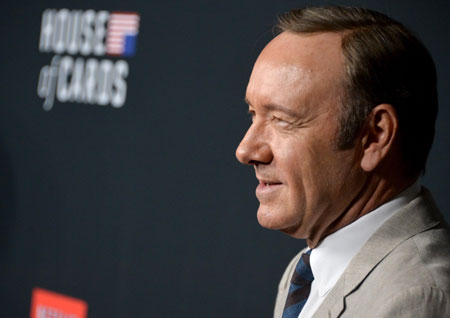Rendezvous with power
Updated: 2014-02-20 07:38
By Wang Kaihao (China Daily USA)
|
||||||||
The comeback of House of Cards brings joys to many Chinese viewers. But apart from providing a glimpse into politics in the United States, analysts tell Wang Kaihao that the popular drama series depicts a shift in stereotypes of China.
On Feb 14, Valentine's Day had a romantic rendezvous with Chinese Lantern Festival. For many single white collars all over China without dates or activities on that day, perhaps one of the best holiday gifts is the comeback of House of Cards, the US political drama television series produced by online streaming media provider Netflix.
"I have been waiting for season two for a whole year," says a veteran American television series fan Li Junmei, from Nanjing, capital of Jiangsu province. "I like Kevin Spacey and David Fincher, but I have little knowledge about US politics."
Li says this show, which depicts Frank Underwood, a fictional Democrat politician climbing up the power strata using contemptible methods, arouses her interest to learn about the White House and the US congress.
"I have to refer to Baidu (China's major search engine) many times within one episode to understand better what the protagonists are talking about, but I don't feel tired. The plot and pace of the series are so captivating."
Her views are shared by many Chinese fans. Feng Hangeng, an IT engineer based in Shenzhen, Guangdong province, says: "You cannot miss a show recommended by President Obama. Everything appears authentic. It's a good opportunity to have a vivid view of what's going on in Washington DC."
According to Douban.com, China's counterpart of IMDb.com, season two of House of Cards has won 9.6 points out of 10, one of the highest-ranked US television series ever, even higher than the final season of multiple awards-winning Breaking Bad.
Nevertheless, Ma Ke, a senior manager in charge of license rights from Sohu.com, says she hesitated introducing the show into China initially. The website, a major online platform streaming US television series, is China's only official broadcaster of House of Cards.
"We are sure it is a top quality series, but the serious story focuses on high-end social elites. We once thought it might not meet the public's demand for entertainment," Ma recalls the days when she introduced season one to Sohu.com in March 2013.
"We never expect its name to become ubiquitous on China's social media immediately after it was broadcast, and that made us decide to buy its intelligence property rights for the next season."
Ma says Sohu's weekly top 10 list of most clicked television series usually include seven or eight domestic series while the rest are South Korean-made, but season two of House of Cards climbed to the fifth place only three days after it was released, which Ma considers a surprise.
Still, it is not a show for the general public. According to statistics of Sohu.com, House of Cards has the most clicks from Beijing, Shanghai and Guangdong province - these are among China's most developed regions, and its major audience includes civil servants, enterprise managers and technical professionals.
According to a report by Phoenix Weekly, even Wang Qishan, secretary of the Central Commission for Discipline Inspection of the Communist Party of China, mentioned House of Cards several times during meetings to emphasize the importance of whip, Underwood's role at the beginning of the series, to keep discipline within a political party.
Perhaps, one of the most frequently discussed topics now is Netflix's unconventional release of the series via cyberspace, abandoning television channels, and even chose the cast and director based on the analysis of its users' habits and references.
"Almost every online media provider in China now uses big data to make their own shows in different degrees," Ma says. "Netflix has made a good model for its Chinese counterparts."
Zhang Guoqing, a researcher with the Institute of American Studies, Chinese Academy of Social Sciences, explains House of Cards has become popular in China because the dark side of US politics reminds Chinese audience of similar plots in costume dramas about concubines' conflicts in ancient royal families. But he considers it as far beyond entertainment.
"Through the series, we find the stereotype of China's image has changed among US media and public. It surprises me that China is no longer a villain in the series, because many American movies previously tend to depict China as a cold war enemy like former Soviet Union. It is encouraging to see the demonization of China has lessen on US screens.
The show explores Sino-US trade, cyber attack and currency disputes, for example, and they even include an important clue throughout the whole season, which is unprecedented among American television series. There is divergence among US high-level decision makers on China policy in the story. It shows the US has gradually accepted the fact that China and the US are not only competitors, but also cooperators.
"China and the US need a fresher and closer bilateral relationship. Though the series still reveal some ambiguous bias against China, it at last releases a signal that the public has an objective view on China's development," Zhang says.
Contact the writer at wangkaihao@chinadaily.com.cn.
|
Executive producer and actor Kevin Spacey draws a big crowd of fans in China as Season 2 of House of Cards debuted simultaneously in China and the United States. Photos Provided to China Daily |
|
Actress Robin Wright arrives at the special screening of House of Cards at the Directors Guild Of America on Feb 13 in Los Angeles in California. |
(China Daily USA 02/20/2014 page10)

 Beauty queen the latest victim in Venezuela unrest
Beauty queen the latest victim in Venezuela unrest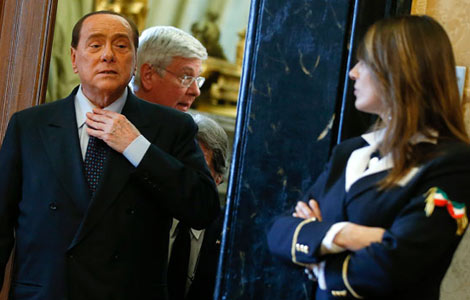
 Italy court finalizes Berlusconi divorce
Italy court finalizes Berlusconi divorce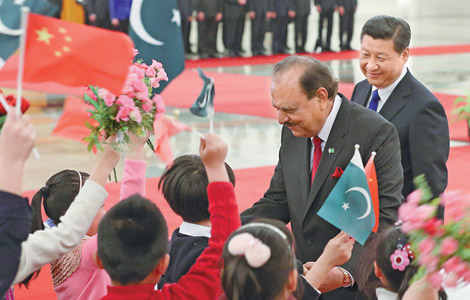
 Neighbors keen to open trade corridor
Neighbors keen to open trade corridor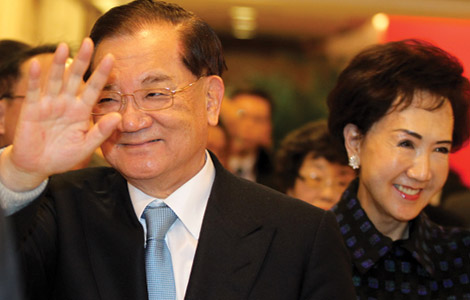
 Beijing wants more cross-Straits contact
Beijing wants more cross-Straits contact
 Spirit of adventure lives on in Antarctic
Spirit of adventure lives on in Antarctic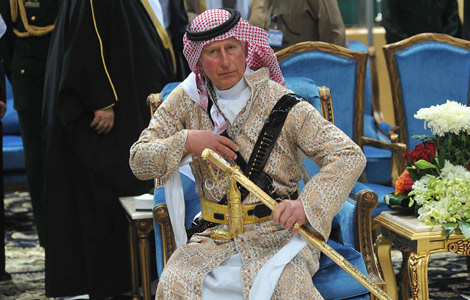
 Prince Charles dances in traditional Saudi dress
Prince Charles dances in traditional Saudi dress
 Maglev trains speeding toward greener future
Maglev trains speeding toward greener future
 Building collapse at Korean resort kills 10
Building collapse at Korean resort kills 10
Most Viewed
Editor's Picks

|

|

|

|

|

|
Today's Top News
Afghan war opposition peaks: Gallup
Beijing opposes Japan's Taiwan ambitions
China to debut new stealth jet
West readies Ukraine sanctions
President Xi made cartoon debut
Country's rich children sent abroad
Probes not target foreign firms
Tencent invests in Dianping for better O2O
US Weekly

|

|
